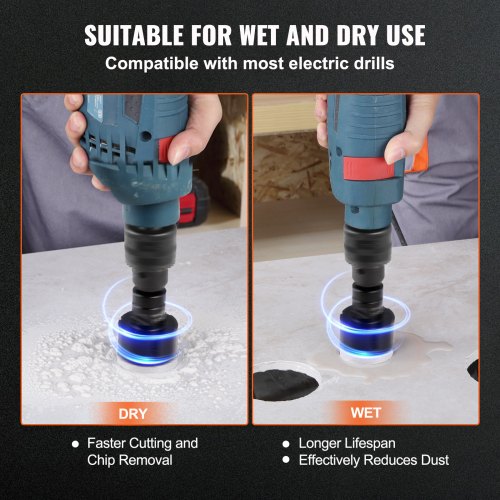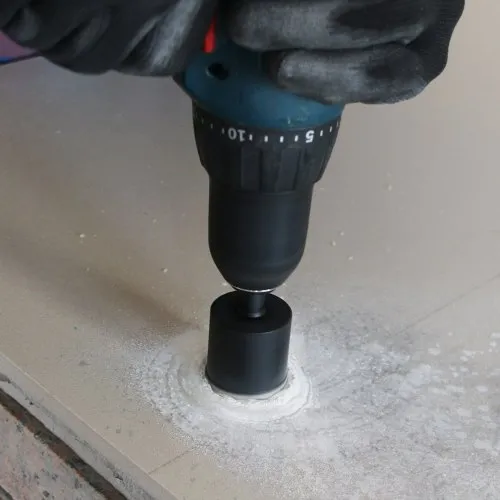Are you wondering what tool is used to drill holes quickly and accurately? Whether you’re fixing something around the house or working on a creative project, knowing the right tool can make all the difference.
Imagine saving time and effort while getting perfect holes every time. You’ll discover the best tools for drilling holes, how to choose the right one for your needs, and tips to use them like a pro. Keep reading to unlock the secret to making your projects easier and more precise!

Credit: www.darttoolgroup.com
Types Of Drilling Tools
Drilling holes is a common task in many projects. Different tools suit different jobs. Choosing the right drill helps get the work done safely and quickly.
This guide covers the main types of drilling tools. Each has unique features for specific uses.
Handheld Drills
Handheld drills are simple tools used for drilling small to medium holes. They are easy to use and portable. These drills usually run on electricity and have a handle for control.
Cordless Drills
Cordless drills run on batteries and offer great mobility. They are perfect when there is no power outlet nearby. These drills come with different speed settings and torque control.
- Use rechargeable batteries
- Lightweight and easy to carry
- Good for light and medium drilling tasks
- May have LED lights to see dark areas
Hammer Drills
Hammer drills combine rotation with a hammering action. They are used to drill into hard materials like concrete and stone. The hammering helps break up the material as the drill bit spins.
Drill Presses
Drill presses are stationary machines. They offer high precision and control. These are used in workshops for metal, wood, or plastic drilling.
| Feature | Description |
| Fixed Base | Provides stability for accurate holes |
| Adjustable Speed | Allows control over drilling speed |
| Depth Stop | Prevents drilling too deep |
| Large Work Surface | Supports the material being drilled |
Specialized Drilling Machines
Specialized drilling machines are designed for unique tasks. Examples include magnetic drills for steel and CNC machines for automated drilling. These tools increase efficiency and precision in industrial settings.
Choosing The Right Drill Bit
Drilling holes requires selecting the right drill bit for your task. Different materials need different bits. Using the correct bit improves your work and extends tool life.
Below is a guide to help you choose the right drill bit for various materials.
Wood Drill Bits
Wood drill bits are designed to cut through wood cleanly. They often have a sharp point at the tip to start the hole easily.
- Spade bits: Good for large holes.
- Auger bits: Ideal for deep holes.
- Brad point bits: Precise and clean holes.
Masonry Drill Bits
Masonry bits are used for drilling into brick, stone, and concrete. They have a tough tip to handle hard materials.
| Bit Type | Material |
| Tungsten Carbide | Concrete |
| Diamond Coated | Stone |
| Carbide Tipped | Brick |
Metal Drill Bits
Metal drill bits are crafted to bore through metal surfaces. They are made from tough materials like high-speed steel.
These bits often have a black oxide finish to reduce friction and heat.
Multi-purpose Bits
Multi-purpose bits work on various materials. They are versatile and handy for general tasks.
Factors Affecting Drill Selection
Choosing the right drill depends on several important factors. These factors help you pick a drill that works best for your project.
Understanding these factors can save time and improve your drilling results.
Material To Be Drilled
The type of material affects which drill you should use. Hard materials need stronger drills and special bits.
Soft materials like wood need less power and simpler drill bits.
- Wood: Use standard twist or spade bits
- Metal: Use high-speed steel or cobalt bits
- Concrete: Use hammer drills with masonry bits
- Plastic: Use sharp bits to avoid cracking
Hole Size And Depth
The size and depth of the hole change the type of drill and bit you need. Bigger holes need larger drill bits.
Deep holes may require drills with longer bits or special features to clear debris.
- Small holes: Use standard drill bits
- Large holes: Use hole saws or spade bits
- Deep holes: Choose drills with longer bits and strong motors
Power Source And Portability
Drills can be powered by electricity, batteries, or air. Your choice depends on where and how you work.
Cordless drills offer good portability but may have less power. Corded drills provide constant power but need an outlet.
- Corded drills: Best for long tasks near power sources
- Cordless drills: Ideal for jobs far from outlets
- Pneumatic drills: Used in heavy industry with air compressors
Precision And Speed Requirements
Some jobs need very precise holes, while others need speed. Choose a drill that fits these needs.
Variable speed drills help control drilling speed and improve accuracy for delicate work.
- High precision: Use drills with variable speed and stable grips
- High speed: Choose drills with powerful motors for fast drilling
- Balanced use: Pick drills with adjustable settings for control
Top Tools For Different Drilling Tasks
Drilling holes requires the right tool for the job. Different tasks need different types of drills.
Choosing the right drill helps you work faster and get better results. Here are some top tools for various drilling needs.
Best Drills For Home Use
For home projects, cordless drills are popular. They are light and easy to handle.
These drills work well on wood, plastic, and light metals. They often come with adjustable speed settings.
- Cordless drills for convenience
- Variable speed for control
- Lightweight design for comfort
Professional Grade Drills
Professional drills are built for heavy use. They offer more power and durability.
These drills can handle tough materials like metal and concrete. They often include hammer functions.
- High torque for hard materials
- Hammer drill option for masonry
- Long-lasting batteries or corded power
Budget-friendly Options
Budget drills are good for simple tasks and occasional use. They offer basic features at low cost.
They are usually corded or have smaller batteries. These drills suit light drilling jobs.
- Affordable prices for beginners
- Simple controls and functions
- Suitable for light drilling only
High-performance Industrial Drills
Industrial drills are designed for heavy-duty work. They handle large-scale construction projects.
These drills have powerful motors and advanced features. They often come with cooling systems to prevent overheating.
- Strong motors for continuous use
- Advanced controls for precision
- Durable build for tough environments
Maintenance Tips For Drilling Tools
Drilling tools need regular care to work well and last long. Proper maintenance keeps them safe and efficient.
This guide covers cleaning, sharpening, battery care, and safety. Follow these tips for better drilling results.
Cleaning And Storage
Clean drill bits and tools after each use. Remove dirt, dust, and debris to avoid damage. Store them in a dry place.
- Wipe tools with a dry cloth.
- Use a brush to clean drill bits.
- Keep tools in a toolbox or case.
- Store in a cool, dry area to stop rust.
Sharpening Drill Bits
Sharp drill bits work faster and safer. Use a sharpening tool or a grinding wheel to fix dull bits.
| Tool | Use |
| Grinding Wheel | Quick sharpening for most bits |
| Manual Sharpener | Simple and low-cost option |
| Bench Grinder | For heavy use and precise edges |
Battery Care For Cordless Drills
Keep batteries charged but avoid overcharging. Store batteries in a cool place and clean contacts often.
- Charge batteries before first use.
- Do not let batteries drain completely.
- Store batteries at room temperature.
- Clean battery contacts with a dry cloth.
Safety Practices
Use safety gear and follow correct procedures to prevent accidents. Check tools for damage before use.
- Wear safety glasses and gloves.
- Inspect drill and cords for damage.
- Keep work area clean and well-lit.
- Use clamps to hold materials steady.
- Turn off and unplug tools when not in use.

Credit: www.vevor.ca

Credit: www.vevor.ca
Frequently Asked Questions
What Tool Is Commonly Used To Drill Holes?
A drill is the most common tool for drilling holes in various materials. It uses a rotating drill bit to create precise holes quickly and efficiently.
Which Drill Bit Is Best For Metal Holes?
High-speed steel (HSS) drill bits are ideal for drilling metal. They resist heat and maintain sharpness for clean, accurate holes.
Can I Use A Cordless Drill For All Materials?
Yes, a cordless drill works on wood, metal, and plastic. However, use the right drill bit and speed settings for each material.
What Safety Gear Is Needed When Drilling Holes?
Wear safety goggles, gloves, and ear protection when drilling. These prevent injuries from debris, sharp bits, and loud noise during operation.
Conclusion
Choosing the right tool makes drilling holes easier and faster. A drill is the most common tool for this job. It works well on wood, metal, and plastic. Knowing the drill type helps you pick the best one. Safety is important; always wear protective gear.
Practice helps you drill straight and clean holes. With the right tool and care, your projects will look great. Drilling holes is simple once you understand the basics. Keep your tools sharp and well-maintained for best results.
